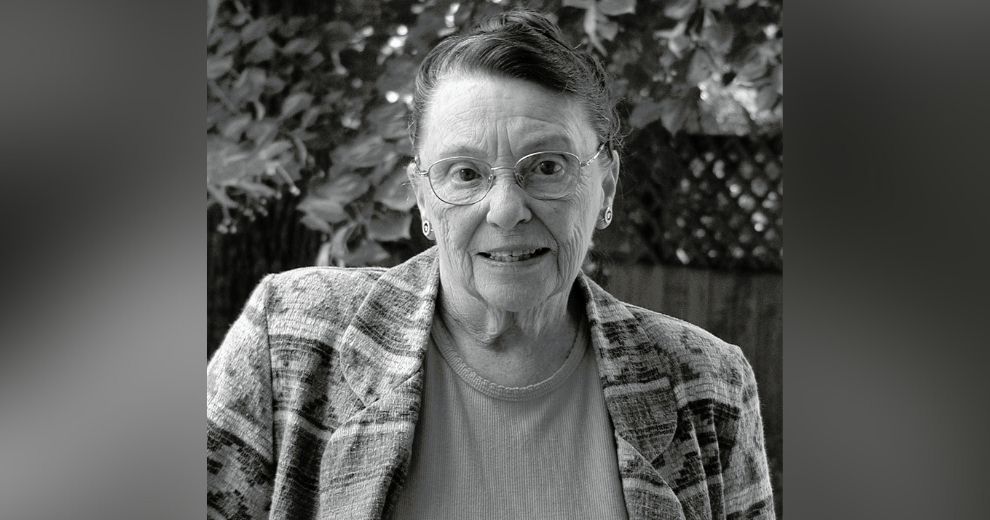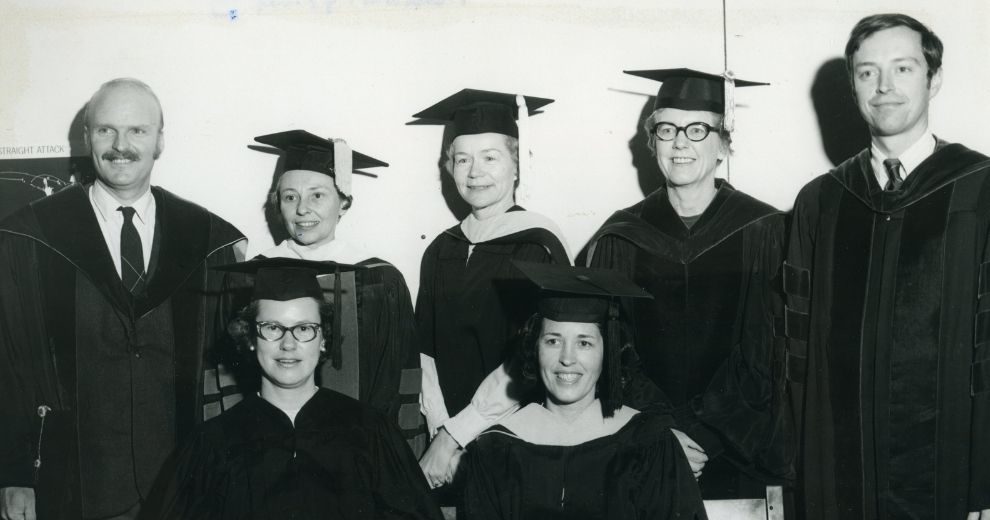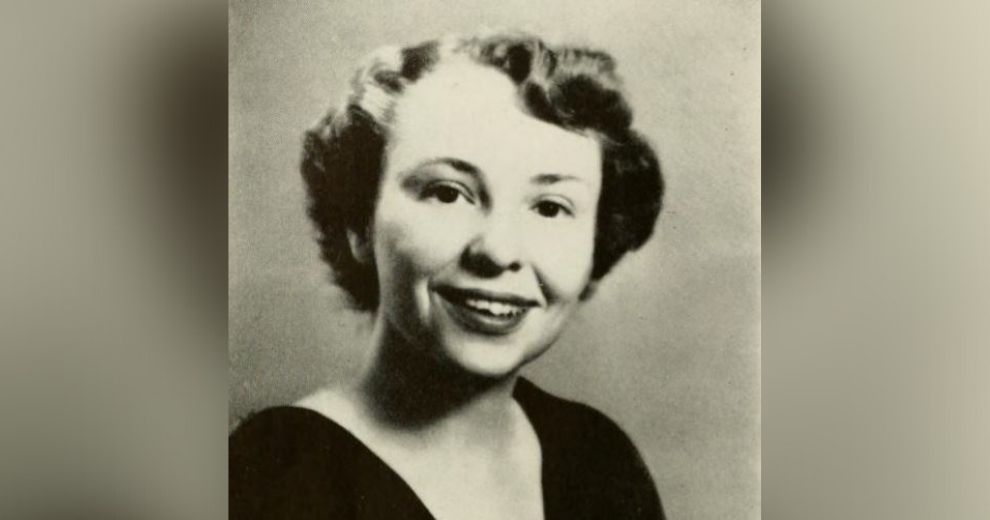Retired Mary Baldwin English professor Ethel Smeak ’53 loved literature passionately — and dedicated much of her life to sharing that love with MBU students. She passed away on September 7 at Augusta Health hospital in Fishersville.
“Ethel was an expert in Elizabethan literature and had an incredible knowledge of the poetry, writings, and plays of the period,” said Dean and Professor Emeritus of English James Lott. But while Smeak published several scholarly papers and a book to positive critical reviews early in her career, “her focus and energy came to be directed to her teaching.”

Lott and Smeak worked together at the university for more than 30 years. They’d met in 1959 as first-year doctoral students in Vanderbilt University’s English literature program. Lott was younger, but Smeak had spent some years teaching at a small college in West Virginia after graduating from Mary Baldwin.
“We bonded and became friends,” said Lott. Smeak often reminisced about her alma mater where, among other distinctions, she’d served as president of student government. It was abundantly clear that Mary Baldwin “held a very special place in Ethel’s heart.”
A twist of fate brought Lott to the university in 1964, when he accepted a professorship in the English department. Smeak was then teaching at James Madison University, but joined her friend on the faculty a year later.
As an instructor she was equal parts demanding and nurturing.
“Ethel loved literature, and she wanted her students to know and love it as well,” said Lott. That said, Smeak approached intellectual activity like an Olympic athlete. She abhorred sloppy thinking and writing, but her intensity, “fairness and encouragement pushed students to work hard, expand their minds, and become better scholars and human beings.”

Pictured in 1970 are Mary Baldwin professors (back row, l-r) Ben Smith, Ethel Smeak, Gwen Walsh, Marjorie Chambers, and James Lott; (front row, l-r) Dorothy Mulberry and Betty Kegley.
Smeak’s pedagogy extended beyond the lecture hall.
“She was a fiercely intelligent and determined person,” and happened to be the English department’s lone woman professor, said Lott. That led female students “to view her as a role model for [how to conduct and assert yourself in] a male-dominated world.”
The effect was amplified through Smeak’s habit of considering pupils through a more expansive lens: These weren’t just literature students, they were members of the greater Mary Baldwin community.
“Ethel saw these young women as continuing a legacy of dedication to knowledge and standards of honor,” said Lott. In a world where patriarchal culture dominated, women had to fashion themselves as strong leaders and advocates for equality. Smeak believed MBU’s transformational approach to learning and its emphasis on empowering students to pursue lives of purpose did just that.
Accordingly, she took on added responsibilities like serving as an advisor for the Honor Council and Student Senate, or helping to plan and edit early iterations of the university’s magazine. She worked closely with the Alumni Association for decades to promote connectivity — and was eventually named one of two honorary life members for her tireless efforts.
“Ethel was a pioneer in the women’s movement and inspired her students — and, frankly, everyone around her — by setting an example of what they could achieve.”
MBU President, Pamela R. Fox
Smeak also helped guide MBU through a crossroads moment in 1974 when she filled a temporary role as dean of students.
“That wasn’t something she wanted to do, but something she felt she had to do for the university’s well-being,” said Lott. “She made that sacrifice because she loved Mary Baldwin and accepted what others were telling her: The college needed her in that role, at least for a time.”
These and other achievements won Smeak a prestigious reputation both on and off campus.
“I will forever remember the day Ethel picked me up as a new president and took me to meet Martha Grafton,” said President Pamela Fox, recalling her initial encounter with Smeak, shortly after arriving at MBU in 2003. It didn’t take long to realize she “was in the presence of two of the most remarkable women within the legacy of Mary Baldwin.”
Smeak’s prowess as a scholar and investiture in the university were legendary. She remained profoundly engaged in the school’s evolution, sharing wise and direct insights.
“Ethel was a pioneer in the women’s movement and inspired her students — and, frankly, everyone around her — by setting an example of what they could achieve,” Fox continued. “She fought for equal footing in the workplace and attained her goals through unflagging patience, tact, and perseverance. She was truly an amazing woman, and will be deeply missed.”

Ethel Smeak graduated from Mary Baldwin in 1953 with a degree in English. (Photo sourced from the Bluestocking yearbook archive.)
Smeak’s service and dedication to the university was commemorated in 1990, when she received the Emily Wirsing Kelly Leadership Award. That same year, she was appointed to the Margaret Hunt Hill Distinguished Chair in the Humanities, which, said Lott, “was a way of honoring Ethel’s demonstrated commitment to students and alumni, and to the institution itself.”
Smeak’s devotion to her alma mater continued after her retirement in 1995 until her death. Anne Holland, director of special projects at the Office of Alumni Engagement, worked with Smeak throughout that time. A highlight was when the two together with Nancy Kunkle Carey ’51 founded the Grafton Society — a special Reunion organization that recognizes MBU alumni of 50 or more years.
“I came to be dear, dear friends with Ethel,” said Holland. She recalled Smeak as a “straight-talking, fun-loving, intelligent, loyal, supportive, and articulate friend. She had this comic flair, and loved humor and wit.
“I remember being incredibly honored when she asked me to call her by her first name,” continued Holland. “We always greeted one another with enthusiasm and energy, even if it had only been a few days since we saw each other. I will miss her dearly.”
Smeak was survived by a troop of nieces and nephews, and their children. The former remember her as a loving aunt that played a major role in their lives and always went out of her way to attend milestone events.
“Ethel’s calling was teaching and she devoted her life to Mary Baldwin College and her beloved students,” the family wrote in a commemorative statement. “She never married, or had children of her own, but it can be said she had many that she taught and mentored through her life. Their deeds and accomplishments can — and should — be viewed as her greatest legacy.”